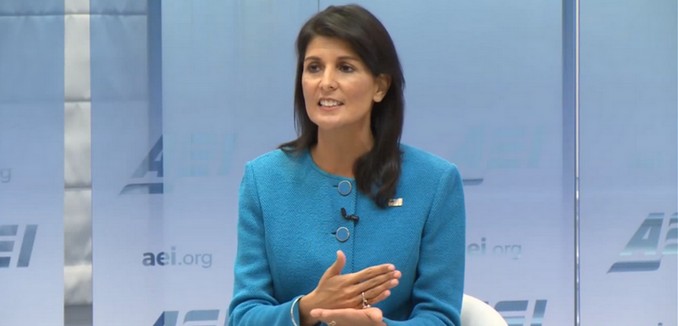In a speech delivered Tuesday at the American Enterprise Institute, United States Ambassador to the UN, Nikki Haley, questioned whether the 2015 nuclear deal with Iran is in the national security interests of the U.S.
In her speech, Haley mapped out a number of concerns about the nuclear deal, or Joint Comprehensive Plan of Action (JCPOA).
While the JCPOA itself only addressed Iran’s nuclear program, UN Security Council Resolution 2231, which endorsed the deal, addressed Iran’s non-nuclear behavior “the missile development, the arms smuggling, the terrorism, the support for murderous regimes.”
Haley noted that Iran has been found to be in violation of numerous aspects of the JCPOA. For example, it was twice found to have exceeded its limit on enriched uranium, yet the world took no action against Iran.
The reason for the reticence to challenge Iran on these violations, Haley explained, was because specific violations and punishments were not mapped out in the deal.
Whether an Iranian violation is big or small – whether it is deemed material or non-material – the deal provides for only one penalty. That penalty is the re-imposition of sanctions. And if sanctions are re-imposed, Iran is then freed from all its commitments that it made. Think about that. There is an absurdly circular logic to enforcement of this deal. Penalizing its violations don’t make the deal stronger, they blow it up. Iran’s leaders know this. They are counting on the world brushing off relatively minor infractions – or even relatively major ones. They are counting on the United States and the other parties to the agreement being so invested in its success that they overlook Iranian cheating.
However, due to fears that declaring Iran in violation of the JCPOA or of resolution 2231 might prompt it to leave the nuclear deal, the international community has chosen “to ignore blatant violations of the UN’s own resolutions,” and allow Iran to continue to threaten the Middle East and develop ballistic missiles capable of delivering nuclear warheads.
The international community has powerful incentives to go out of its way to assert that the Iranian regime is in “compliance” on the nuclear side. Meanwhile, the UN is too reluctant to address the regime’s so-called non-nuclear violations. The result is that Iran’s military continues its march toward the missile technology to deliver a nuclear warhead. And the world becomes a more dangerous place.
In addition to the JCPOA and resolution 2231, Haley explained, there’s a third document that governs the nuclear and that is the Corker-Cardin bill, which “governs the relationship between the president and Congress.”
According to Corker-Cardin, there are several reasons the president could choose not to certify Iran’s compliance with the deal. The first would be if Iran is found to be in material breach of the JCPOA. It also “asks the president to certify that the suspension of sanctions against Iran is appropriate and proportionate to Iran’s nuclear measures and that it is vital to the national security interests of the United States.”
“In short, we must consider the whole picture, not simply whether Iran has exceeded the JCPOA’s limit on uranium enrichment,” Haley explained. “We must consider the whole jigsaw puzzle, not just one of its pieces. That’s the judgment President Trump will have to make in October. And if the president does not certify Iranian compliance, the Corker-Cardin law also tells us what happens next. What happens next is significantly in Congress’s hands.”
Failing to certify Iran’s compliance on any ground, Haley continued, “does not mean the United States is withdrawing from the JCPOA.”
Rather, it would be up to Congress to debate and decide whether to re-impose nuclear sanctions on Iran. Congress would be free to impose non-nuclear sanctions on Iran in any case.
“Ambassador Haley provided the predicate for the president to conclude that the JCPOA is not in the vital national security interests of the United States,” wrote Mark Dubowitz, CEO of the Foundation for Defense of Democracies, “while signaling to Congress that now may not be the opportune time to reinstate JCPOA sanctions and take America out of the deal.”
[Photo: American Enterprise Institute / YouTube]




